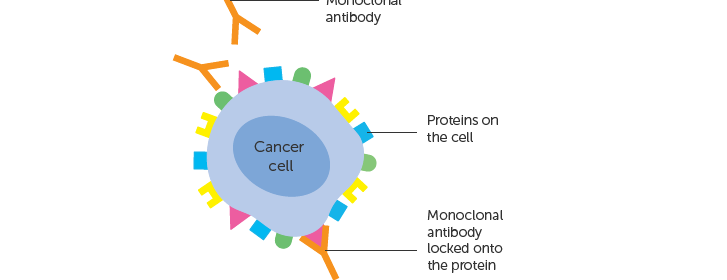Monoclonal Antibodies Against Breast Cancer

Coinciding with the world day of the fight against breast cancer , we wanted to analyze the impact that relatively new biological therapies, especially monoclonal antibodies , have had against breast cancer.
One of the greatest advances made in recent years stems from knowledge of the different biological subtypes of breast cancer . Each of these profiles is susceptible of being treated with specific therapeutic resources, which allows administering personalized treatment in each case that is more effective and less aggressive.
In this sense, antitumor agents with more specific action on tumor cells have been developed in order to increase their efficacy and avoid their toxicity as much as possible by reducing the effects on healthy cells of traditional chemotherapy treatments.
Monoclonal antibodies against breast cancer , far from replacing chemotherapy drugs, are nowadays an adjuvant therapy that has shown beneficial effects in cases of tumors with more aggressive pathophysiological characteristics.
In this entry we collect monoclonal antibodies against breast cancer approved to date for therapeutic use in this pathology.

Monoclonal Antibodies As Antitumor Drugs
The effectiveness of monoclonal antibodies against breast cancer depends directly on the antigenic expression of tumor cells. In this sense, the target antigen must be specific to tumor cells, express itself at high levels, must not detach from the cell surface and must be accessible.
Monoclonal antibodies against breast cancer act through different mechanisms of action, including:
- Opsonization
- Activation of the complement system
- Cytotoxicity
- Target antigen blocking
In addition, the most innovative therapies conjugate drugs to monoclonal antibodies whose specificity transports them to cancer cells, thus increasing the efficacy of these drugs and reducing their toxicity.
Monoclonal Antibodies As Antitumor Drugs
Currently, there are 4 monoclonal antibodies against breast cancer whose therapeutic use is authorized by health authorities.
- TRASTUZUMAB
Trastuzumab was the first monoclonal antibody against breast cancer to be licensed nearly 2 decades ago.
It is a humanized monoclonal antibody of the IgG1 type, against the human epidermal growth factor receptor 2 (HER-2). The HER-2 receptor is overexpressed in 20-30% of breast cancer cases, causing a faster proliferation of the tumor and greater aggressiveness.
Trastuzumab inhibits cell proliferation of HER-2 positive tumors through two main mechanisms of action:
- Binding of trastuzumab to the overexpressed receptor inhibits signaling via the phosphatidylinositol-3-kinase pathway, and as a consequence, inhibits tumor cell proliferation.
- It is a strong mediator of antibody-dependent cytotoxicity.
- BEVACIZUMAB
Bevacizumab was the second antibody to be licensed to expand the therapeutic arsenal against breast cancer.
In this case, it is a monoclonal antibody against vascular endothelial growth factor ( VEGF ) . This antibody binds to all isoforms of this factor, blocking its binding to the biological receptors present on the surface of vascular endothelial cells.
The main mechanism of action is to block the binding of VEGF to its receptor, thus inhibiting tumor neovascularization, and consequently tumor growth.
- PERTUZUMAB
Pertuzumab is one of the most recently licensed monoclonal antibodies against breast cancer.
It is a humanized monoclonal antibody of the IgG1 type, which, like Trastuzumab, specifically binds to receptor 2 for human epidermal growth factor (HER-2) , and acts through the same mechanism of action.
- TRASTUZUMAB-EMTANSINE
Trastuzumab-emtansine is a covalent conjugate of the monoclonal antibody trastuzumab with the cytotoxic agent DM1 , which was licensed for marketing just over two years ago.
The DM-1 chemotherapy, whose mechanism of action consists of the inhibition of tubulin polymerization, thus stopping the cell cycle and promoting apoptosis, acts selectively on HER-2 positive tumor cells thanks to its binding to trastuzumab. Upon binding of this antibody to the receptor, the complex is internalized in the cell releasing the cytotoxic metabolites inside the cell.
The monoclonal antibodies against breast cancer have been a breakthrough in the personalized and selective treatment for certain types of breast cancer and can specifically block the proliferation of tumors, and opening the door to the development of new drugs conjugated to direct chemotherapy selectively to tumor cells, thus making it more effective and less toxic.
